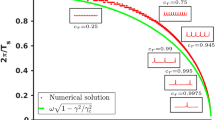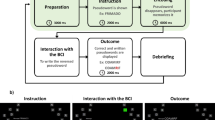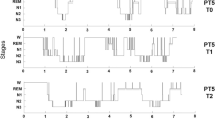Abstract
Based on the idea that intentions have different penetrability to perception and thought (Fodor, 1983), four Stroop-like tasks, AA, AW, WA, and WW are used, where the A represents an arrow and the CPPR (closest processing prior to response) is perception, and the W represents a word and the CPPR is thought. Event-related brain potentials were recorded as participants completed these tasks, and sLORETA (standardized low resolution brain electromagnetic tomography) was used to localize the sources at specific time points. These results showed that there is an interference effect in the AA and WA tasks, but not in the AW or WW tasks. The activated brain areas related to the interference effect in the AA task were the PFC and ACC, and PFC activation took place prior to ACC activation; but only PFC in WA task. Combined with previous results, a new neural mechanism of cognitive control is proposed.
Similar content being viewed by others
Article PDF
Author information
Authors and Affiliations
Corresponding author
Rights and permissions
About this article
Cite this article
Chen, A., Lei, X., Huang, X. et al. Neural activity dissociation between thought-based and perception-based response conflict. Nat Prec (2007). https://doi.org/10.1038/npre.2007.1269.1
Received:
Accepted:
Published:
DOI: https://doi.org/10.1038/npre.2007.1269.1



